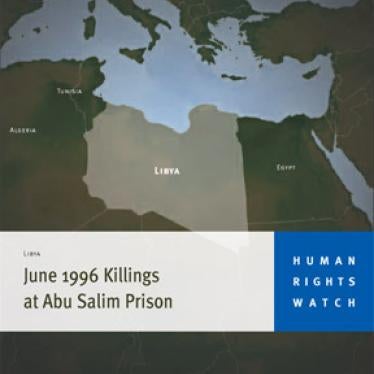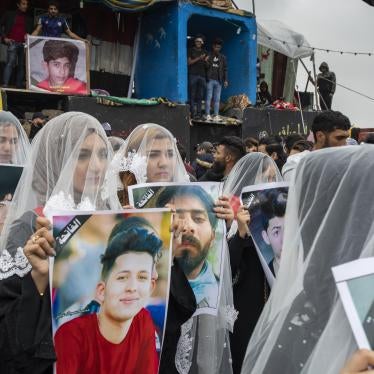(New York) - Libya should follow its release of 88 prisoners on the night of October 15, 2009 with the release of all political prisoners and those unjustly detained in Libyan jails, Human Rights Watch said today.
Those released include 45 members of the Libyan Islamic Fighting Group (LIFG), most of whom had been in prison since the mid-90s after being convicted in unfair trials of an attempted coup against the Libyan leader, Mu'ammar Gaddafi. Their release came after the group renounced violence in August 2009. Authorities in Abu Salim prison also released 43 "members of other jihadist groups," a Gaddafi Foundation news release said.
"The release of these prisoners is a positive step, particularly because many were prosecuted in unfair trials," said Sarah Leah Whitson, Middle East and North Africa director at Human Rights Watch. "Now the government needs to go ahead and free all of its political prisoners, people jailed merely for expressing views critical of the government, and all those unjustly detained."
The LIFG prisoners' trials before the People's Court and the State Security Court had been criticized as unfair, for, among other reasons, a lack of adequate access to lawyers. The group had entered into negotiations, facilitated by the Gaddafi Foundation, with the Internal Security Agency, resulting in the release of 136 of their members over the past two years.
Libyan prisons still contain dozens of prisoners who were sentenced after unfair trials for expressing their political views. Abdelnasser Al-Rabbasi, a writer, remains in Abu Salim prison, where Human Rights Watch interviewed him in April. He is serving a 15-year sentence for writing a novel about corruption and human rights. By the Justice Ministry's own reckoning, about 200 prisoners who have served their sentences or who have been acquitted by Libyan courts remain imprisoned under orders of the Internal Security Agency. Internal Security, under the Interior Ministry, controls two prisons, Ain Zara and Abu Salim, where "security" detainees are held. Internal Security has refused to carry out judicial orders to free these prisoners, despite calls from the justice minister for their release.
In another positive announcement, the Gaddafi Foundation also said that the government soon would demolish Abu Salim prison and move the prisoners to a temporary prison, but did not make clear when or how this would occur. The government has long used the prison, which is notorious for the torture and abuse of those held there, to detain political activists, writers, and journalists who have criticized the government.
Abu Salim was the site of a 1996 prison massacre in which 1,200 prisoners were killed. The Libyan government has not made public any account of what happened or held anyone responsible. On September 6, 13 years after the killings, the acting secretary of defense established a seven-judge investigation panel, headed by a former military tribunal judge, to conduct an investigation into the incident.
"The demolition of Abu Salim prison, the site of egregious human rights violations for decades, will be a very important gesture," said Whitson. "But at a minimum all its prisoners should be transferred to Ministry of Justice prisons, and any of them unfairly or arbitrarily detained should be immediately released."






